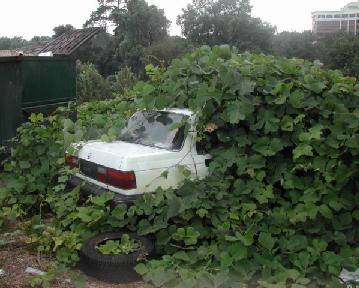
Posted on 03/11/2008 12:13:11 PM PDT by Red Badger

S. Degradans is the source of the Ethazyme mixtures.
University of Maryland research that started with bacteria from the Chesapeake Bay has led to a process that may be able to convert large volumes of all kinds of plant products, from leftover brewer’s mash to paper trash, into ethanol and other biofuel alternatives to gasoline.
That process, developed by University of Maryland professors Steve Hutcheson and Ron Weiner, is the foundation of their incubator company Zymetis, which was on view today in College Park for Maryland Governor Martin O’Malley and state and university officials.
"The new Zymetis technology is a win for the State of Maryland, for the University and for the environment,” said University of Maryland President C.D. Mote, Jr. "It makes affordable ethanol production a reality and makes it from waste materials, which benefits everyone and supports the green-friendly goal of carbon-neutrality.
“It also highlights the importance of transformational basic research and of technology incubators at the University. Partnership with the State enables University of Maryland faculty and students to commercialize new discoveries quickly.”
“Today, Marylanders are leading the nation in scientific discovery and technology innovation,” said Governor Martin O’Malley. “We must continue to invest in Marylanders like Steve Hutcheson and in their revolutionary ideas to protect our environment, create jobs, and improve lives.”
75 Billion Gallons a Year
The Zymetis process can make ethanol and other biofuels from many different types of plants and plant waste called cellulosic sources. Cellulosic biofuels can be made from non- grain plant sources such as waste paper, brewing byproducts, leftover agriculture products, including straw, corncobs and husks, and energy crops such as switchgrass.
When fully operational, the Zymetis process could potentially lead to the production of 75 billion gallons a year of carbon-neutral ethanol.
The secret to the Zymetis process is a Chesapeake Bay marsh grass bacterium, S. degradans. Hutcheson found that the bacterium has an enzyme that could quickly break down plant materials into sugar, which can then be converted to biofuel.
The Zymetis researchers were unable to isolate the Bay bacterium again in nature, but they discovered how to produce the enzyme in their own laboratories. The result was Ethazyme, which degrades the tough cell walls of cellulosic materials and breaks down the entire plant material into bio-fuel ready sugars in one step, at a significantly lower cost and with fewer caustic chemicals than current methods.
Hutcheson projects a $5 billion enzyme market for biofuels. The energy bill passed by the U.S. Senate in December mandates oil companies to blend in 21 billion gallons of cellulosic ethanol with their gasoline by 2022.
Source: University of Maryland
Ethanol ruins your engine, gets less MPG, and costs more to use in the long run. Why anyone would want to use this junk is beyond me.
Good deal...
Could use all the plant material mowed and cut from interstate and other highways.. trillions of pounds not now even gathered.... More highways could be planted with “grass”.. or whats that plant in Geogia that grows a foot a day.. that you cant get rid of..
If it pans out, this sounds promising. The whole ethanol from corn thing just seemed like a lot of tail-chasing.
But it turned out to be bogus. The predictions that were in the article never came true.
So now I am very skeptical of these kinds of claims. If this new article is true, then why isn't the product available on the open market for people to buy? My guess is that it's probably as bogus as the article from 5 years ago.
KUDZU!.............
E100, ie 100% ethanol, can be used to fuel engines.....
http://www.greencar.com/features/saab_turbo_biopower/
Marijuana

Kudzo
Well, that’s all fine and good until we deplete the earth of trash. We’ll have all kinds of Greenies complaining about the lack of McDonald wrappers and beer bottles on the side of the road.
Finally! A solution to the KUDZU problem!........
You mean "wallet filling" :)
My point is that it’s all talk. They aren’t actually making and selling it on a large scale.
What's the lesser evil, imperfect domestic ethanol or foreign oil that we cannot afford?
As a side note to promising energy alternatives, consider this high density fuel cell.
http://www.freerepublic.com/focus/f-news/1983282/posts
Ethanol doesn’t burn our food RB, unless you want to call soda pop food.
This appears to actually be quite promising...plus it starts with the letter “E” - very important.
Think of all the leaves raked up each fall...or the land cleared down here in FL for housing. Mountains and mountains of feedstock for these little critters...
Corn sweetener may not qualify as a “real” food, but corn is used for much more than that. Chicken feeds, cattle feeds, and pork are all in the mix. Anything that is related to corn thru them is also, cooking oils, milk, cheese, butter, eggs, bread and on down the line. The grocery prices are higher than I’ve ever seen them, and it’s not all due to higher oil prices.
Disclaimer: Opinions posted on Free Republic are those of the individual posters and do not necessarily represent the opinion of Free Republic or its management. All materials posted herein are protected by copyright law and the exemption for fair use of copyrighted works.